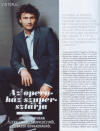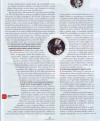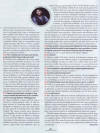|
|
|
|
|
|
|
|
ELLE Magyarország, March 2014 |
|
| |
Superstar of the operahouse
|
| |
| Jonas Kaufmann on love, passion and Bavarian leather trousers |
| |
  
Question: why have you been named 'Jonas'? Do you feel any community
with the prophet who tries to flee from his fate? This almost happened
to you when you almost changed your profession.
JK: It was not on religious ground that my parents chose this
name for me, they simply liked it. But my grandfather was opposing tooth
and nail saying that they would ruin my life, everybody would be mocking
of me, because at that time almost nobody was called like that in
Germany. Therefore I got a second Christian name, which is Alexander, so
that should I as an adult dislike Jonas I might change it. But I have
not done so. As to fleeing from my fate, I might have chosen bad
teachers or I might have misunderstood them, but around 1995 it seemed I
would not be able to continue in this profession. Then, fortunately, I
found a teacher who showed me another way and therby he saved my voice,
my carreer and my life.
Question: You are one of
the greatest stars of classical music. Do you like being called 'the
star tenor'?
JK: Well, at the beginning, I hated
it. I felt that a star tenor is someone who has not got into the
limelight because of his performance as a singer. And this disturbed me
a lot. With time I got used to it, but I do hope it is not with these
labels that I identify who I am. Of course it is great that I have so
much success, first of all because I see what my voice is able to
achieve: it not only enchants or entertains, but it also finds the way
to people's soul, which is a huge responsibility and must be used for
good purposes. There was a time when I had the impression that
everything is more important than the way I sang. For instance, when
critics were preoccupied with my appearance rather than with my voice.
It is belittling when they say: of course, he is successful because he
is so handsome. Luckily enough it has changed in recent years and people
are more interested in my performance than in my appearance, which is
fantastic, because no matter what benefits success might give, the only
reason for which I chose this profession is that I adore singing. Not
only here in the opera, but in general, anywhere, anytime and to
anybody. I sing everywhere: in the shower, in my car, on end. This is my
passion and it would be terrible if I could not do it. On the other
hand, my carreer is time consuming, in addition, it made me 'public
property' and it is not easy for me to protect my private life. If
somebody comes to me in the street and asks if I am me, I cannot answer
that no, no, you mistake me for someone else, this would not be fair. I
try not to be away for too long from my family, this is the reason why
we moved back from Zuric, where we used to live, to Bavaria, because
here I can better balance family life with my work. One could say I came
back to my roots, since I was born in Munic, many friends of mine live
here, I like this neighbourhood, this people, I belong here.
Question: Do you then wear Bavarian folk costume?
JK: Lederhosen? (leather trousers) Of course I do.
And not only at the Oktoberfest, but at family events, weddings,
birthdays too. By the way, it is a very practical garb, I used to wear
it very often when I was a child, because it is simply
wear-and-tear-proof. For a small boy, there is nothing more boring than
a mother who keeps on nagging him to take care of his trousers. Whereas
with the Lederhosen, if it gets torn you simply take it to the cobbler
who would stitch a patch on it and there you go.
His lough is
contagious and his fast English speech gets a kind and unique flavour by
the sporadic German words he mixes into it. As he is speaking, I can see
the little boy he was in front of me, the little boy whose brimming with
life he has kept in his adult self, just like he is always able, in a
miraculous way, to achieve that when he is singing I should feel exactly
the same feelings that he does.
JK: If my
thoughts are not preoccupied by the technical aspects of singing, if my
mind and my soul are free and I am attentive only to my feelings, then
my voice changes, and this is the change due to which another person
will be able to live through what I am experiencing. This is of course
not easy to achieve, and I do believe that you cannot simulate emotions.
It is therefore very important that I have a normal private life,
because I must experience joy, pain, a variety of human emotions in
order for me to be able to produce them in my roles. If you want to
seduce a woman on stage, it would only be credible if you have done it
in your real life. Love is the best example. In love, you will
immediately see if something is not sincere.
Question:
Is it not dangerous to experience so intensive emotions day after day?
How can you control them?
JK: To be honest, I
don't know how I manage, it simply works. You learn it by doing it over
the years. Karajan called it 'controlled ecstasy', which is a
contradiction, but still, it is what it is about. When I am playing, I
am fully transformed into the character I am playing, I feel his
feelings, I live his life and I am him. Then the curtain drops, and it
is over. Now, one second is enough, initially it took longer. A role is
for me like a pair of gloves: I put them on, they fit perfectly, then I
take them off and they are not there any more. Thank God, I have to add,
as otherwise I would get into trouble, because I would not know anymore
who I am. This is a kind of valve which helps to cope with the probably
too strong emotions.
Question: Once you said
that while earlier the whole world used to fall at the feet of great
singers, today „everybody is only waiting for me to make a mistake”. Do
you really mean this?
JK: In Caruso’s time great
singers used to be supertars and super rich, but even a couple of
decades ago the public was rejoicing and cheering even if the singer
happened to have a bad day, because they loved and appreciated him for
what he had delivered earlier. Today, however, there are at least 10
people at each single performance who would be recording the entire
programme and would upload it to the internet that very night, and if
the singer did make a mistake, the whole world would be informed of it
by the next day. This is a lack of respect for both the profession and
the singer, who is not an automaton but an artist, a human being. Those
who strive for perfection should buy an overengineered CD for
themselves. A live performance is very humane and mistakes make a part
of it. And I am not talking about those who cannot sing, or cannot sing
any more, but about artists who very simply have good or bad days. I
want to make it clear: I know numerous people who are fully aware of
this, who appreciate it and who forgive the singer any eventual mistake.
Others, however, who have never stood on a stage in their lives and do
not have the slightest idea of what it takes to practice this
profession, well, these people are the most fierce critics. According to
their expectations, a 100% performance is acceptable, whereas a 70% is
not. I am not talking about myself, since I am so lucky that even if I
performe at 85%, that is also all right. But I beg your pardon, it is
not possible that the same ten people should sing in all opera houses of
the world every night. There are a lot of fantastic artists in addition
to them. And anything could happen to me, too, anytime. I try to plan in
advance and to avoid that something does happen to me, but there are no
guarantees. I keep on learning, practicing, making efforts to develop,
if not for other thing than because if I leaned back in my chair saying
that now, I know everything, that would be extremely boring.
Question: Yet, your life seems to be perfect from every
point of view, not only professionally. For instance, you are a good
hand at computers or cars. Tell me something which you are bad at? Are
you able to fit together an IKEA cupboard, for instance?
JK: Of course, I am. That is one of the easiest things
in the world.
Question: Can you cook?
JK: You bet I can. What is more I would clean up the
kitchen after me, albeit not too willingly. I am an artist and I would
put it like this: I am more than delighted to build a wall but I would
need someone else to put all the tools away when I am finished. Being
organised is not one of my strengths and I am pretty sure I will not
achieve perfection in this regard.
Question: Can
you change the diapers of a baby? I guess you can as you are father to
three children.
JK: Yes, I can, I have done it
on numerous occasions.
Question: do you go to
parent-teacher conferences at school?
JK: So,
there we are. I do, or I used to go, but it is at least two years now
that I last was able to attend one. While we are talking here, my son
has a performance at the school and he would have liked me to go. But I
could not.
Q: is there a place in Munic where
you can wish something and it will come true?
JK:
yes, there are 4 bronze lions in Residenzstrasse which you have to
touch. And people keep on touching them so that they are quite shiny by
now. But if they do really fulfill their wishes, I do not know.
Question: And what would you wish?
JK.
Time. I have never met anybody who would be fully satisfied with what
they’ve got. It is either too much: too much work, too much success, or
too few. The most difficult thing is to find the right balance, to
achieve exactly that much success that makes me satisfied, that allows
me to earn enought money to allow me to live free from care and still to
be free, so that I can decide what I want. So that I can go hiking,
biking or sailing. Currently, I do not have time for these things. Time
is the most important factor which is missing from my life so that I
could feel being even luckier and happier.
|
|
|
|
|
|
|
|
|
|
|
|
|
|
|
|
|
|
|